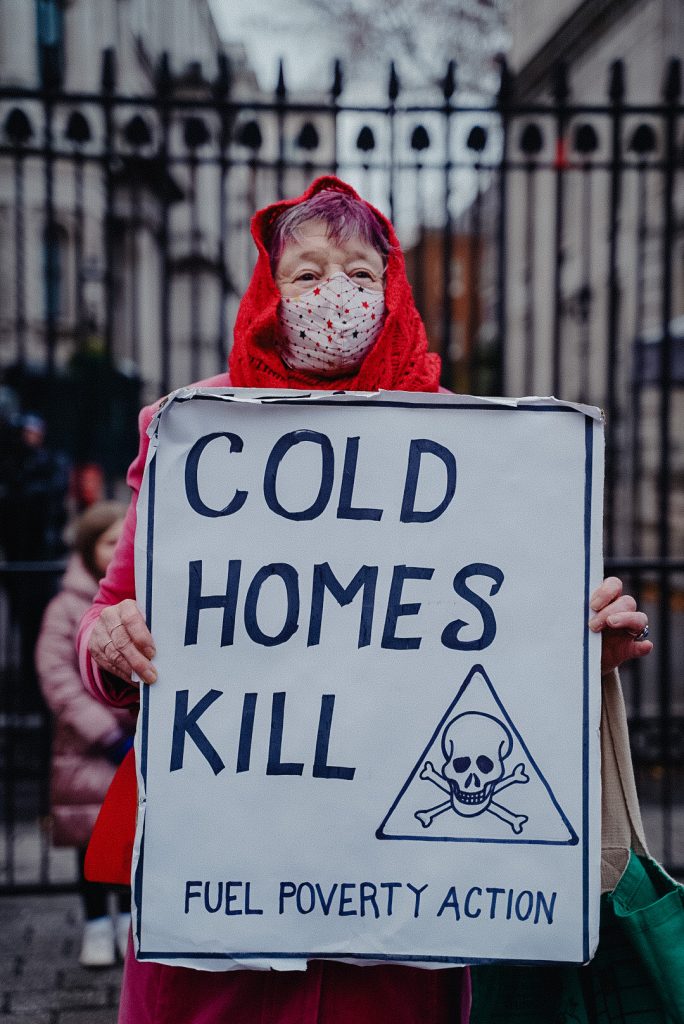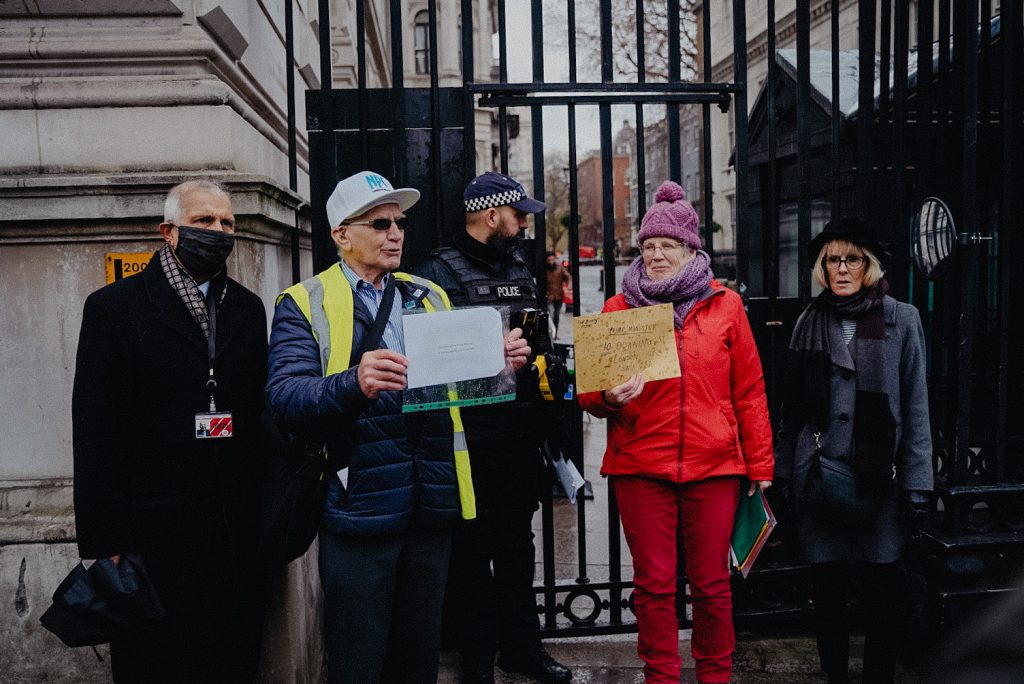Read the letter below or download it here
FPA-Letter-to-Liz-Truss-6-Sept-2022Press Release: FPA and DPAC protest Ofgem’s abusive standing charge policies
Fuel Poverty Action and Disabled People Against Cuts have together written to Ofgem CEO Jonathan Brierley about the gross injustice of the present standing charges, including loading the cost of failed suppliers onto this part of people’s bills. [1] They say
“It is appalling that yet again Ofgem is punishing low income customers for its own failed regulation and the upside down priorities of the energy industry. …This is consistent with the blinkered approach that has led you to give “too much benefit to companies at the expense of consumers”, in the words of Christine Farnish, the Ofgem director who resigned last week.
Ofgem has claimed (2) that high standing charges are the only way to protect high users, some of whom are people with health needs for electricity, eg for electrical medical equipment. But the two groups suggest that Ofgem’s obligation to vulnerable customers is being abused as an excuse for policies that impoverish and endanger thousands of people, including many who are disabled people. They name instead several alternative ways to protect people with high energy needs – without impoverishing vast numbers of low income customers.
With Fuel Poverty Action’s proposal of Energy For All (e4a) each household would be entitled, free, to enough energy to cover basic needs, but people would pay a higher tariff for what they use above that amount. This would offer much needed security to all – including those who need more because of their health, disabilities, housing conditions, or family size. It would be paid for by the higher per-unit tariff on excess use, by windfall taxes and by ending the millions of pounds now poured daily into fossil fuel subsidies.
Other options listed include extensions of the Warm Home Discount, social tariffs, better disability benefits, and good safe insulation for vulnerable customers. And they say that companies that cannot fulfil their purpose of providing the energy people need at a cost they can afford, could – and must – be brought back into public hands.
Ruth London from FPA comments,
“Instead of looking at real, proportionate, workable changes to the current upside down pricing framework, Ofgem has chosen to continue hitting low income users harder than affluent neighbours. The standing charge means that however much they cut down their usage many people will never be able to pay their bills.”
Paula Peters of DPAC says,
“I’m a low energy user because I am terrified to switch it on and worrying about costs all the time. It’s making me permanently anxious as it is all of us. Last winter I was in a lot of pain with a cold house. I needed NHS intervention: a steroid injection and a Nebuliser at A & E.”
[1] https://www.fuelpovertyaction.org.uk/wp-content/uploads/2022/08/Letter-to-Ofgem-re-decision-on-Standing-Charge-August-2022.pdf
[2] https://www.ofgem.gov.uk/publications/follow-our-review-arrangements-recovering-costs-supplier-failure
Fuel Poverty Action is Hiring!
We’re delighted to announce that we’ve secured funding to pursue our campaign for Energy For All! Below we’re advertising two posts – one full time, one part time. We very much look forward to expanding our team.
To apply, please send cover letter and CV to [email protected] by 5 pm on 7 July 2022 (extended deadline) with “e4a Application” in the subject line, and get in touch if you have any questions.
Energy for All Campaign Coordinator
Download a PDF of the job description here or read it below:
Energy-for-All-Campaigner-CoordinatorEnergy for All Campaigner: Parliamentary Focus
Download a PDF of the job description here or read it below:
Energy-for-All-Campaigner-Parliamentary-focusHeat and Light are Basic Rights: Energy Customers Need the Same Rights and Protections as Domestic Water Customers and We Need it Now
Fran Lobel
The current energy crisis means that millions of households will not be able to afford their energy bills or costs and will be plunged into fuel poverty. The sharpest end of fuel poverty is ‘fuel crisis’ whereby households who use prepayment meters ‘self-disconnect’ from their supply when they can’t top-up. Customers with prepayment meters pay for their energy use in advance, usually by taking a key or card device to a local shop, buying credit which is loaded to the device, and then topping up the meter with credit. When all credit is exhausted the lights go out and the heat cuts off. ‘Self-disconnection’ is the commonly understood term for when this happens, although its use is contentious due to the implication that it’s an outcome customers choose.
Self-disconnection: the sharpest end of fuel poverty
Energy suppliers’ too-common recourse to recuperating debt is to pressure customers to switch to a payment method that might not be suitable, safe or practical, without exploring alternative methods of repayment. Energy suppliers also remotely ‘mode-switch’ indebted smart metered customers to prepayment mode without adequate warning and safety and practicability checks. As a final measure, suppliers forcibly install prepayment meters under warrant where (often frightened, vulnerable customers, unsure of their rights) fail to engage with debt collection processes.
We have particular concerns about the effects of chronic self-disconnection on prepayment energy customers. We are also deeply concerned that energy suppliers will recuperate problem debt resulting from unprecedented price rises by forcibly installing large numbers of prepayment meters. Self-disconnection is a fate that awaits hundreds of thousands more customers who won’t be able to afford their monthly or quarterly bills.
Energy is required to support and participate in life.
Domestic water utilities customers have been protected from loss-of supply due to unaffordability and debt since 1999. The use of ‘limiting devices’ i.e. trickle valves as a sanction and coercive means of debt recovery was also prohibited under the same legislation.
During the 1994 2nd reading of the Water Domestic Disconnections bill, the point was made that water is unique as an essential to life commodity as it has no substitute. By contrast, it was suggested customers disconnected from their energy supply could manage for a few days using a calor gas heater or a primus stove.
It’s hard now, nearly three decades later, to imagine this being considered usable advice for off-supply energy customers. Calor gas heaters and primus stoves are no longer common back-of cupboard items stashed for an emergency or a camping trip, and customers who can’t afford small cash top-ups are not in a position to peruse the Argos catalogue as an interim solution to staying adequately warm. There never has been a safe or adequate substitute for electricity; it’s always been unsafe for those who need to keep medicine in the fridge or rely on power for medical or mobility equipment to lose supply. More generally and aside from providing safe and reliable light, electricity is now essential for the phone and online connectivity required for children’s homework, study, working from home, job search, accessing medical services, advice and support services, financial inclusion, and maintaining a universal credit account. As fewer households have a landline phone, ironically, it is now usually a requirement to use a mobile phone or other chargeable device and to maintain a Wi-Fi or data allowance to access emergency support from energy suppliers.
Comparisons, in recent decades, between the essentialness of domestic water and energy supplies have eroded beyond the point of useful and meaningful distinction.
Water prepayment meters were banned in 1998.
Water prepayment meters, known as ‘Budget Payment Units’ (BPUs) were outlawed in 1998 after a consortium of six local authorities brought a successful legal challenge to the installation and use of BPUs to The High Court. The local authorities argued that customers with BPUs were likely to suffer more frequent disconnections from their water supply than customers without, and this could lead to the spread of infectious diseases.
The High Court ruled that multiple statutory safeguards in place to protect customers from disconnection were bypassed by the use of BPUs. The same principle and outcomes apply to energy customers who self-disconnect. It’s clear that energy customers now need parity of protection with water utilities customers from all kinds of disconnection, including self-disconnection.
Too often not safe, not practical, & sometimes lethal
We have noted that energy suppliers are routinely non-compliant with safety and practicability rules regarding prepayment; this means that householders who take life-sustaining medication that requires refrigeration and those who use mobility aids and medical devices that rely on power face life-threatening situations. Self-disconnection is also dangerous for those who are elderly or very young, or have health conditions worsened by cold. We have noted that forced installations of prepayment meters are executed without regard to safety and practicability regulations.
Widespread destitution: from consumer debt problem to a public health crisis
More broadly, frequent self-disconnection leads to destitution and perpetuates inter-generational disadvantage. It means that families are unable to cook food supplied to them from food banks; a month’s supply of frozen food is spoiled and lost; parents can’t log into Universal Credit accounts, miss messages, and then get sanctioned; adults go to work and job interviews without being able to have a shower; children can’t do their homework after school (and boil kettles to bathe in the mornings before school).
It is true that energy customers are now only very rarely disconnected from their supply due to debt, but this ‘good news’ message is misleading. Energy suppliers don’t disconnect indebted energy customers because this no longer a necessary sanction; suppliers use warrants and rights of entry legislation, originally established in order to disconnect customers, to install prepayment meters and let householders self-disconnect from their supply. (Alan Murdie, the long-time editor of The Fuel Rights Handbook has questioned the lawfulness of re-purposing this legislation to forcibly install a different payment method device.)
If actioned widely in response to large numbers of customers defaulting on unaffordable bills, this practice threatens to turn a consumer debt problem into a into a public health crisis.
The prohibition that came into force in 1999 on disconnecting households from their domestic water supply was made as a paradigm-shifting public health measure. Indebted domestic water utilities customers can face legal and other debt enforcement action, but measures that threaten life, health, and cause severe detriment to all members, including children and infants, of an indebted household are rightly prohibited.
The energy regulator considered a prohibition on all disconnections as an option in the future should this be required…….
The energy regulator consulted from 2018-2020 on improving outcomes for consumers who experience self-disconnection and self-rationing, and regulations designed to protect prepayment consumers from the kind of detriments outlined above came into force in December 2020. We have noted that energy supplier compliance with these regulations is poor and none have faced enforcement action as a result.
In August 2019, during the pre-statutory phase of its consultation to improve outcomes for consumers who experience self-disconnection, Ofgem noted the following:
We note that there is currently no obligation on regulated companies which prohibits gas and electricity disconnections on all meter types, except in certain circumstances and for particular customer groups. Disconnection due to debt should only be considered as a very last resort by suppliers and disconnections due to debt are now very infrequent. At this stage, we are not proposing to introduce a prohibition on all disconnections, similar to one in the water sector, but we will consider this as one option in the future should this be required.
The above was given serious consideration before the pandemic; energy customers have since been hit concurrently and consecutively with the effects of the pandemic, disruption and additional costs associated with multiple supplier failures, and, now, unprecedented price rises. The ‘future’ referred to above should be considered now and the option is indeed required.
Measures required now and an end to forced installations of prepayment meters
- As an immediate-term measure, energy supplier licence conditions intended to protect householders from disproportionately aggressive debt collection tactics should be robustly enforced, if breached.
- Energy suppliers are quick to recommend prepayment meters to indebted customers as a means of helping the household to budget. Where chronic unaffordability is the underlying issue, the prepayment meter is used to self-ration rather than budget and self-disconnection is inevitable. Licence conditions that compel energy suppliers to consider the customer’s individual circumstances and ability to pay should be robustly enforced, if breached.
- Energy suppliers should also be compelled to proactively review their prepayment customer base to check if prepayment is safe and practicable for new and existing customers and follow through with the required actions.
- Energy customers are currently protected by a prohibition on installation of prepayment meters under warrant where the installation would traumatise the householder due to their mental incapacity and/or psychological state. We hold the view that any practice brutal to a degree to traumatise any customer groups, in any circumstances, should be prohibited and call for the practice to be prohibited altogether.
What would a prohibition on self-disconnection look like?
Some lateral thinking and ingenuity would be required. The water sector avoided the scale of this regulatory and technical would-be dilemma as only a relatively small number (around 21,000) water prepayment meters had been installed before the prohibition came into force. It’s timely to consider the technical issues in relation to the spectacular take-off of FPA’s #EnergyForAll petition which accrued 240,000 signatures within days of being launched and is still gathering pace at just over 400,000 (at time of writing).
If implemented, #EnergyForAll would ameliorate the worst problems currently faced by prepayment customers and would prevent this payment method being enforced upon indebted credit-billing customers. As things are, prepayment customers could still be at risk of self-disconnection if they exceeded their allowance. This would mean that energy customers most likely to be low-income and have other vulnerabilities would not benefit from the protection of energy as a right in the way that credit-billing customers (far less likely to be low-income and vulnerable) would benefit.
But technical problems have technical solutions which can be found if the right to energy as an essential-to-life and basic right is understood and implemented as a matter of urgency.
Since 1999, water companies have remained in profitable private ownership, despite predictions at the time that the removal of disconnection as a sanction would lead to ruinous levels of bad debt. Water Utilities companies have learned to engage with indebted customers and recover debt using a variety of methods including legal action, but excluding brutality.
Energy customers need parity of protection, now more than ever. Consumer debt should never lead to destitution.
We can’t be disconnected from water – why is it still ok for heat and light?
Fran Lobel has worked with Repowering London as an energy advisor and advocate and continues to work on energy and utilities affordability and energy rights issues. She has a particular interest in rights and protections for prepayment customers.
Press Release: FPA tells Ofgem: standing charge discrimination must stop now.
Fuel Poverty Action has sent a letter to Ofgem challenging new discriminatory policies in advance of this Friday’s price cap rise. Fuel Poverty Action reports that the administrative costs of taking on customers from failed energy suppliers has been loaded onto the fixed, standing charge element of energy bills, which nobody can escape. It puts lives at further risk as people who are already rationing heat and power are forced to pick up the tab for industry failures, which Ofgem sanctioned.
Fuel Poverty Action’s co-director Ruth London said, “Why have Ofgem decided to make the poorest customers pay for their bad decisions and for bad practice in the industry? This huge injustice must be urgently reversed. Then standing charges should be ended, and we should move instead to Energy For All, a pricing structure where everyone will get enough energy free to cover their basic needs for heating, cooking, and power.”
She adds, “Prepayment meters are another way that people with the least resources — and often with the leakiest, most poorly insulated homes — are forced to pay the highest price for fuel. These meters are often imposed without consent, cost more than direct debit, and have the effect of cutting people off supply. As prices increase, it is absolutely urgent to end such upside-down policies.
“The support offered by the government – essentially a loan that customers will have to pay back, and some help for council tax payers – barely scratch the surface of what is needed. Much more drastic changes are urgent, to ensure the basic right to warmth.”
The move away from standing charges is a step towards the new pricing structure: Energy or All, a basic supply of energy free to all, to cover needs like heating, lighting, and cooking.
Energy for All has gained momentum rapidly with over 300,000 signatories on a petition launched by Fuel Poverty Action. Signatories have joined Fuel Poverty Action in writing to Ofgem and have so far sent 1,200 letters to CEO Jonathan Brearley.
ENDS
For media inquiries please contact Alexa Waud on 07751748026
Or email us on [email protected]
Spokespeople are available for broadcast interviews.
FPA’s letter to Ofgem regarding the standing charge
You can read our letter to Ofgem below or download it as a PDF file by clicking here.
Letter-to-Ofgem-re-Standing-Charge-from-FPAEnergy For All Manifesto | Show your organisation’s support for Energy For All
Support Energy For All – the revolutionary change in energy pricing that you endorsed. We now have a Manifesto, which we’ll be launching with an evening online event. Everyone is invited to join the launch on 23 March at 6.30pm.
If you are a representative of an organisation, we invite you to sign the Energy For All Manifesto and help make the launch a success by demonstrating the widespread determination to see Energy For All become a reality.
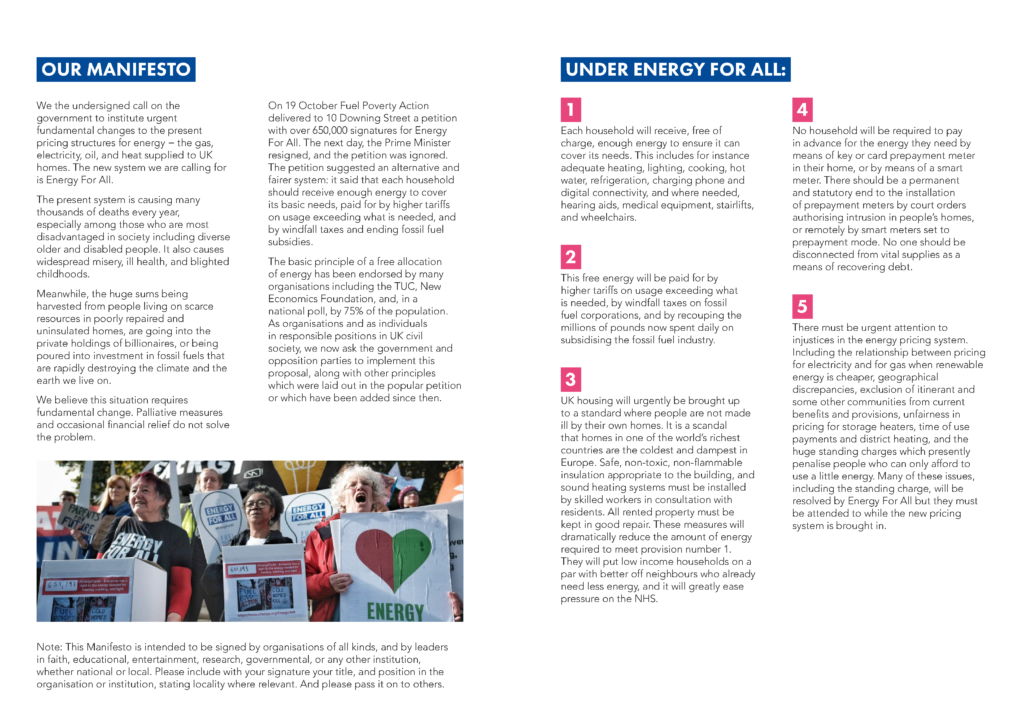
If you are an individual who supports Energy For All, take digital action and ask your MP to support a Universal Basic Energy Allowance. The Early Day Motion for a universal basic energy allowance was launched in parliament on 18 October 2022 and will have its second reading on 24 March – the day after our Manifesto launch.
The nightmare of prepayment meters being forcibly imposed on customers who could not avoid going into debt has exposed the rottenness of a system based on profit rather than need. We won a suspension of this practice, but now need to stop the debt accumulating in the first place.
The Manifesto has gone through a long process of consultation. It spells out many of the implications of Energy For All, beginning with action to insulate homes, install sound heating systems, and deal with the injustices of the present pricing system – including the linkage of electricity prices to the exorbitant cost of gas, instead of cheaper, cleaner, and more climate-friendly renewables. We hope you will like it, add your organisation’s name, share it with others, and join us on 23 March!
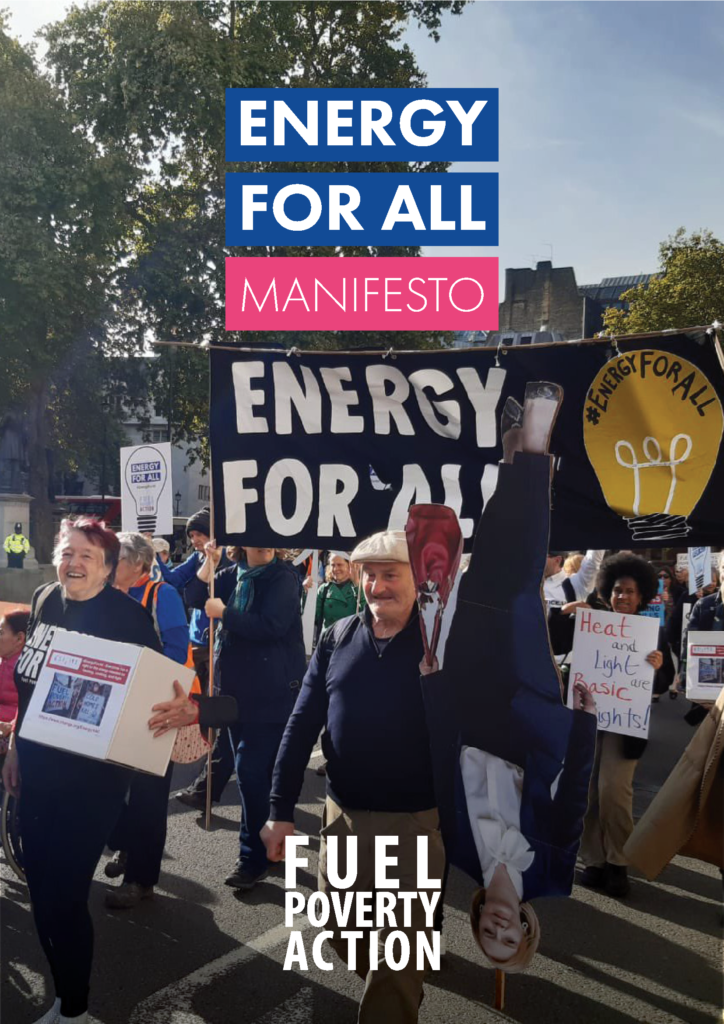
Malus Court Watergate
Graeme Langton and Eddie Farrell, Malus Court residents
Following Pendleton Together’s revelation late Friday afternoon by letter, Malus Court residents will be without water for 30 hrs this coming Wednesday. How will this affect residents?
On Malus Court we have a range of ages and disabilities living on here. Ages range from new-born babies up to residents in their 90’s. Disabilities include mental health conditions, dementia, end of life diagnosis and conditions keeping residents bed bound. For example, the resident who is 90 years the day before the water switch off needs constant care – help with bathing and medications and regular toilet needs throughout the day and night. He needs to be kept warm and eat regular hot meals. His wife in her late 80’s also has medical needs and also needs medical care daily being diabetic. The strain on their health is enormous, not only physical but mentally as well. They struggle to cope heating their flat due to spiralling bills that come with a heating system that is not suitable with the property. There is no insulation on the property. Malus Court is under fire watch since Grenfell. Fire risk recommendations since 2017 have been ignored. And this couple live 7 floors up, fearing if a fire did happen they would die in the building.
Now we have ‘Watergate’, switching water off for 30 hrs. Pendleton Together, our landlords, and Salford Council who own the properties have put these measures in place for the Watergate disruption:
- They have offered use of ( 1 ) toilet for 84 flats totalling over 100 residents, situated over 100 metres away and only accessed by leaving Malus Court and braving the weather that day/night.
- They have offered bottled water if we contact them or go fetch it ourselves. ( I am sure the bedbound residents will mange that (not)) .
- They also refuse to open their offices for residents to have face to face conversations with management, although the rest of the country have returned to work. But let’s be thankful, they have offered to come to the back door and speak outside with residents through resident liaison officers who have no authority and repeat same answer – ‘we don’t know, someone will ring you back’ – which never happens.
So this gentleman and his wife will have no water for 30 hrs. They’ll have no toilet facilities in their home to use as they would not be able flush toilet when they both need access to a toilet all day/night due to their medical needs. They cannot wash and keep clean for 30hrs. But if they walk 100 metres and queue up outside they might be able use the one toilet available if they don’t soil themselves waiting or they die due to the cold or exertions to get there. This is just one example. How do families feed babies and wash them?
All residents should be put in hotels or alternative accommodation until this Watergate has ended.
The past years since Grenfell residents have had to endure:
- Windows leaking, and going into debt because of heating bills for a system that does not warm your home but costs hundreds of pounds per month.
- No insulation on building making them very, very cold.
- Fire risk recommendations not actioned.
- Vermin infestation/ silver fish.
The list is endless. And now Watergate and still our ward councillors, local mayor and Manchester mayor and MP ignore our plight and refuse to visit or even open dialogue with residents over our concerns. Lives are at risk and the local authorities are failing in their duty of care. And if something tragic happens while we wait for them to help, ‘Lessons must be learnt’ will be the answer.
Winter Deaths Protest 2021
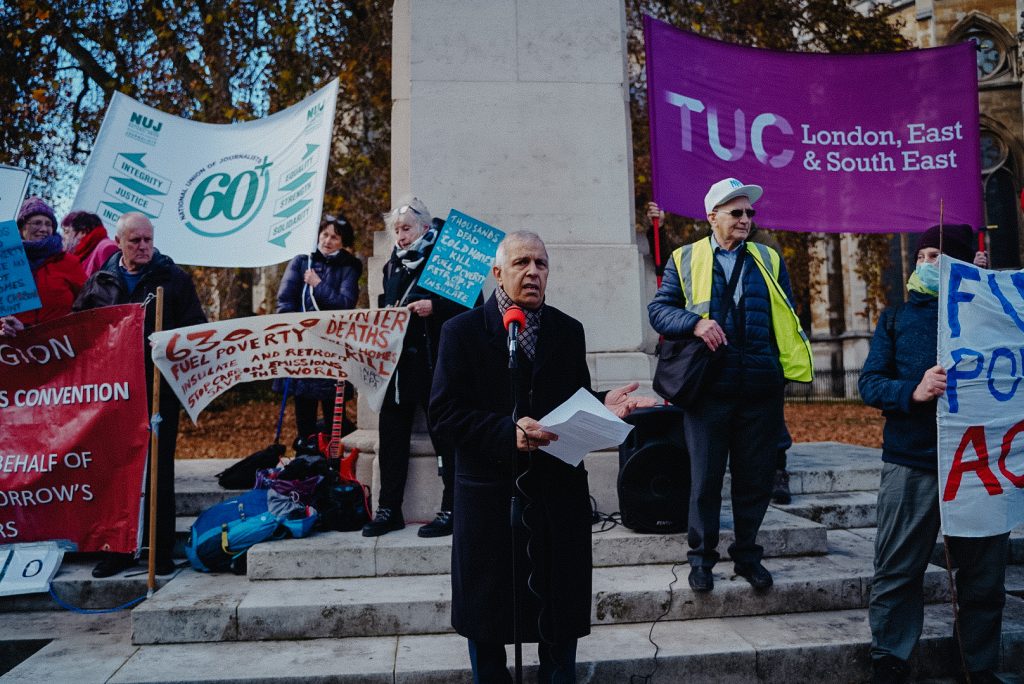
26 November was a cold day but hundreds turned out in Westminster to mark the “excess winter deaths” due to fuel poverty in 2020 – 21. The statistics published that day were confused and obscured due to Covid, but even in an average year over 10,000 people die in cold homes. This year Fuel Poverty Action and the National Pensioners Convention co-organised a rally outside Parliament, and delivery of a letter to 10 Downing St. Speakers Ruth London from FPA, Lord Prem Sikka, and Sue Ferns, TUC President, all emphasised that these deaths are totally avoidable — that there is plenty of money available in this wealthy country.
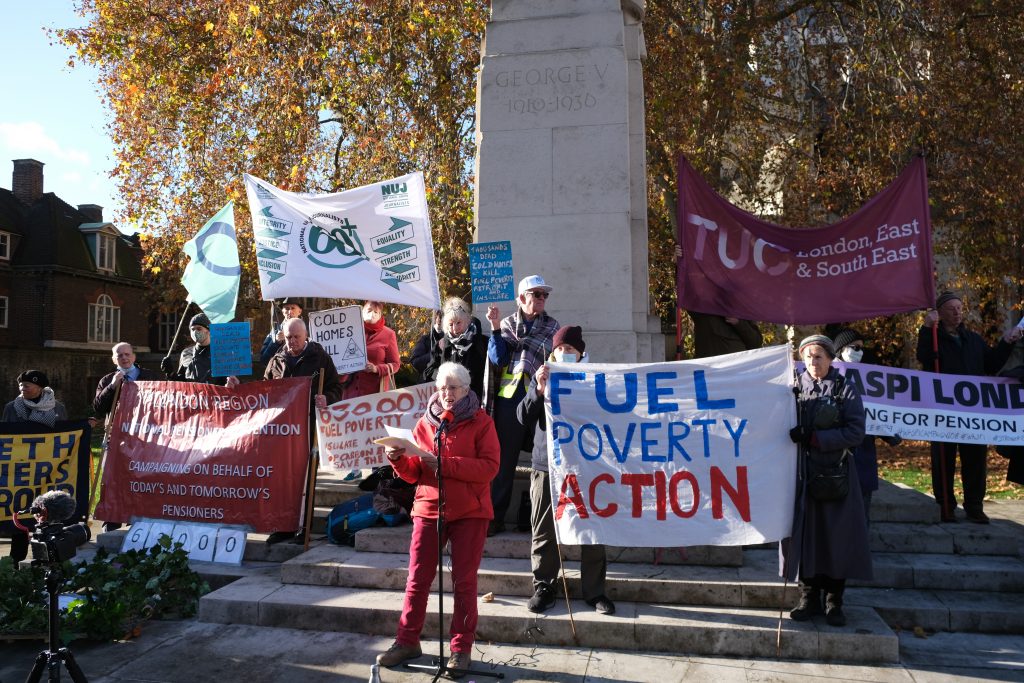
The protest was joined by a wide range of organisations including trade unions, pensioners’ organisations, tenants, and Friends of the Earth, who kindly provided a sound system for the day (full list below — thank you for coming!) And singer-songwriter Gary Jackson warmed us up to start the event with his rousing new song: “Heating or Eating”.
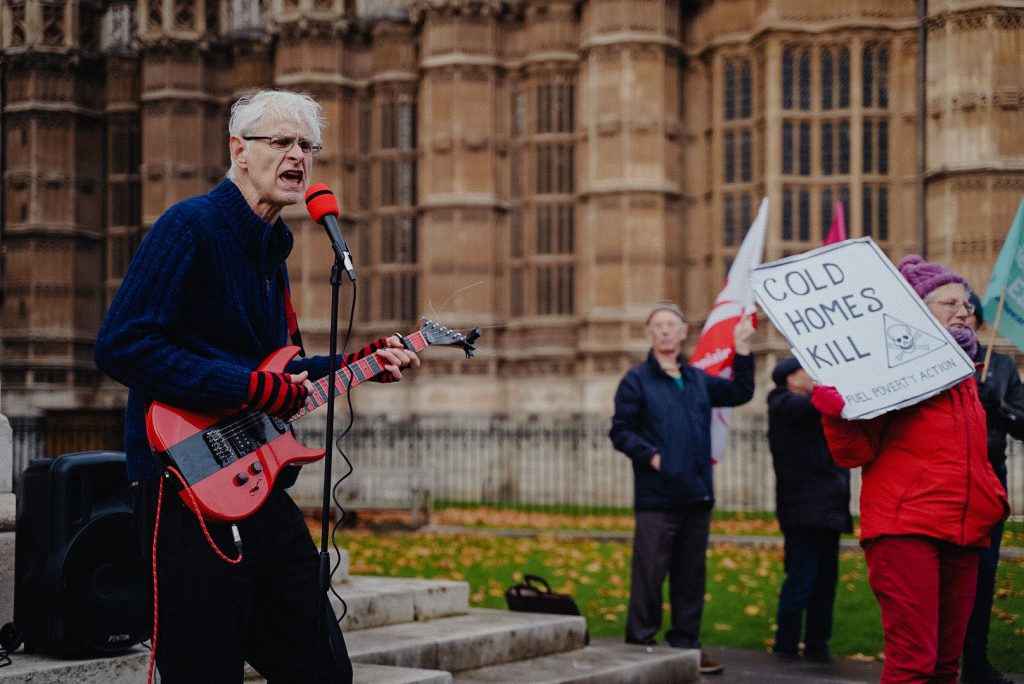
The day ended with the letters given in at Downing Street, a huge wreath laid at the cenotaph for this past year’s fallen fighting the cold, and a strong message to the Prime Minister who had begged for forgiveness when he lost his place in speaking to the CBI — No, Prime Minister, you will not be forgiven!
Fuel Poverty Action (FPA) and London Region National Pensioners Convention (NPC) were joined by TUC London East and South East region (TUC LESE), TSSA, CWU, UNISON retired members, NUJ 60+, Thames Valley NPC, South East NPC, Lambeth Pensioners Action Group, Southwark Pensioners Action Group, Women Against State Pension Inequality (WASPI) London and Scotland, Friends of the Earth, Camberwell and Peckham Labour, Southwark Group of Tenants Organisations.
You can read Ruth London’s speech from the event here. See below for photos from the event.
Plenty of Money: FPA Speech at Winter Deaths Protest – 26 Nov. 2021 – Westminster
So, we’re back here again this year with the NPC to mark the thousands of deaths suffered by people who can’t afford to heat their homes.
This year is worse — because cold damp homes and a rampant respiratory illness do not go well together.
And next year will probably be worse again, because the price of gas has soared and it’s still going up.
The people who pay the highest prices are the ones who have least to begin with, like people on PPMs. That has to change.
Millions of people are rationing every hour of heating.
Pensioners are staying in bed to keep warm, or going to bed early, getting ill from the cold, and in some cases dying lonely, miserable deaths.
This protest is not just to MARK these deaths.
It’s not just an annual ritual to say we won’t forget them. That would be important enough. But this demonstration is more than that. Because these thousands of deaths are totally avoidable.
The government says there is no money to save lives. Yet there is PLENTY of money.
I’m going to take a risk now — because it’s hard to take in any numbers in a speech.
It’s particularly hard when these numbers have loads of zeros on the end.
They count on us to not notice when they give out millions and take away billions — what’s the difference after all? Just some zeros!
But I’m going to take the risk of giving a few examples of where to look for the money we need.
- This spring, the government closed down early the £1.5bn Green Homes Grant scheme, which was supposed to help UK householders insulate our homes. This scheme was so badly designed and managed that it collapsed after just six months. The money has not been replaced. The Treasury still has that money, which could still be used to insulate our homes, keeping us warm, bringing down our bills, and reducing carbon emissions at the same time.
- Because of rising energy prices the UK Treasury could gain an extra £1bn in carbon tax, on top of £4bn they’ve already made this year. Plus another £100 million from VAT receipts due to rising energy prices.
- Oil corporations, internationally, are returning exceptional profits on the spoils of these extra high prices we are paying. On 4 November we wrote to Alok Sharma, the President of COP26, demanding a Windfall Tax on this money — to be used to relieve fuel poverty.
- A wealth tax on the richest 1% of households in Britain – those with fortunes in excess of £3.6m – could create at least an additional £70 billion a year — even with 50% tax avoidance!
It is worth looking closely at that £70 billion.
A few weeks ago, at the COP26 conference in Glasgow, the international deal to mitigate climate change was nearly derailed because all the rich countries together refused to find $100 billion for poorer countries that are ravaged by floods and droughts and wildfires and famines — countries where people have done nothing at all to cause this catastrophe that is now threatening life all over the world.
$100 billion they could not find. Yet £70 billion pounds — £70 BILLION — is about the same as 100 billion dollars. That money could come from a wealth tax on just the richest 1%, in just one small country, the UK.
The world is being driven into a ditch and millions are going cold, or dying of heat stroke, or starving, to save pennies that would not even be noticed by billionaires in their yachts and private planes.
This country, even just the City of London, has plenty of money.
- It is subsidising fossil fuels — those same fossil fuels that were supposed to be so cheap that we couldn’t afford to switch to renewable energy, those same fossil fuels that we now can’t afford.
- It is going on wealthy individuals joyriding into space, even as we are all being told to cut down on carbon emissions.
- Thirty UK millionaires are ASKING for their billions to be used to support people who are struggling to survive. They have told the chancellor, “We know where you can find that money – tax wealth holders like us.”
And at the same time, Universal Credit is cut,
Disability benefits never got the uplift in the first place,
take home pay is hit by the NI tax,
and the government has “suspended” the pensions Triple Lock.
And our precious health service, that our lives depend on, is being sold off, dismantled, and starved of funds.
Medical and care staff are leaving in droves because pay and conditions are so bad.
Within a few miles of the obscene wealth of private individuals who have profited from contracts and price hikes during the pandemic, are millions of UK families and pensioners going to bed hungry or shivering in the cold.
Families are rationing gas, electricity, and heating, sometimes to an hour or less a day. Children are unable to study, or play. Parents don’t know how they will get through the winter.
Almost every health condition is exacerbated by cold. And people who are old, disabled, homeless, hungry, or suffering from a long term illness, are at risk of death.
Deaths from fuel poverty in this wealthy country are not inevitable. They are an obscenity.
They’re a result of deliberate policies on housing, fossil fuels, pensions, benefits, taxes, and wages.
This cannot be allowed to stand.
Ruth London, Fuel Poverty Action, 26 November 2021
Links:
https://www.nea.org.uk/news/call-for-energy-tax-windfall-to-help-poorer-uk-households/
https://www.nea.org.uk/news/call-for-energy-tax-windfall-to-help-poorer-uk-households/
https://gala.gre.ac.uk/id/eprint/33819/https://united-society365.uk/13897/we-can-afford-to-contribute-more-uk-millionaires-call-on-chancellor-to-introduce-wealth-tax/


